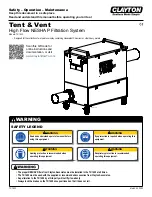
- ii -
• Do not use the existing refrigerant piping.
-
The old refrigerant and refrigerant oil in the existing
piping contains a large amount of chlorine which
may cause the refrigerant oil of the new unit to dete
-
riorate.
-
R410A is a high-pressure refrigerant and can cause
the existing piping to burst.
• Use refrigerant piping made of C1220 (CU-DHP)
phosphorus deoxidized copper as specified in the
JIS H3300 “Copper and copper alloy seamless
pipes and tubes”. In addition, be sure that the in
-
ner and outer surfaces of the pipes are clean and
free of hazardous sulphur, oxides, dust/dirt, shav
-
ing particles, oils, moisture, or any other contami
-
nant.
-
Contaminants on the inside of the refrigerant piping
may cause the refrigerant residual oil to deteriorate.
• Store the piping to be used during installation
indoors and keep both ends of the piping sealed
until just before brazing. (Store elbows and other
joints in a plastic bag.)
-
If dust, dirt, or water enters the refrigerant cycle,
deterioration of the oil and compressor trouble may
result.
• Apply a small amount of ester oil, ether oil, or
alkyl benzene to flares. (for indoor unit)
-
Infiltration of a large amount of mineral oil may
cause the refrigerant oil to deteriorate.
• Use liquid refrigerant to fill the system.
-
If gas refrigerant is used to seal the system, the
composition of the refrigerant in the cylinder will
change and performance may drop.
• Do not use a refrigerant other than R410A.
-
If another refrigerant (R22, etc.) is mixed with
R410A, the chlorine in the refrigerant may cause the
refrigerant oil to deteriorate.
• Use a vacuum pump with a reverse flow check
valve.
-
The vacuum pump oil may flow back into the refrig
-
erant cycle and cause the refrigerant oil to deterio
-
rate.
• Do not use the following tools that are used with
conventional refrigerants.
(Gauge manifold, charge hose, gas leak detector,
reverse flow check valve, refrigerant charge base,
refrigerant recovery equipment)
-
If the conventional refrigerant and refrigerant oil are
mixed in the R410A, the refrigerant may deterio
-
rated.
-
If water is mixed in the R410A, the refrigerant oil
may deteriorate.
-
Since R410A does not contain any chlorine, gas
leak detectors for conventional refrigerants will not
react to it.
• Do not use a charging cylinder.
-
Using a charging cylinder may cause the refrigerant
to deteriorate.
• Do not use antioxidant or leak-detection additive.
• Be especially careful when managing the tools.
-
If dust, dirt, or water gets in the refrigerant cycle, the
refrigerant may deteriorate.
• If the air conditioner is installed in a small room,
measures must be taken to prevent the refriger
-
ant concentration from exceeding the safety limit
even if the refrigerant should leak.
-
Consult the dealer regarding the appropriate meas
-
ures to prevent the safety limit from being exceeded.
Should the refrigerant leak and cause the safety
limit to be exceeded, hazards due to lack of oxygen
in the room could result.
• When moving and reinstalling the air conditioner,
consult the dealer or an authorized technician.
-
If the air conditioner is installed improperly, water
leakage, electric shock, or fire may result.
• After completing installation work, make sure that
refrigerant gas is not leaking.
- If the refrigerant gas leaks and is exposed to a fan
heater, stove, oven, or other heat source, it may gen-
erate noxious gases.
• Do not reconstruct or change the settings of the
protection devices.
-
If the pressure switch, thermal switch, or other
protection device is shorted and operated forcibly,
or parts other than those specified by Mitsubishi
Electric are used, fire or explosion may result.
• To dispose of this product, consult your dealer.
• The installer and system specialist shall secure
safety against leakage according to local regula
-
tion or standards.
-
Following standards may be applicable if local regu
-
lation are not available.
• Pay a special attention to the place, such as a
basement, etc. where refrigeration gas can stay,
since refrigeration is heavier than the air.




































